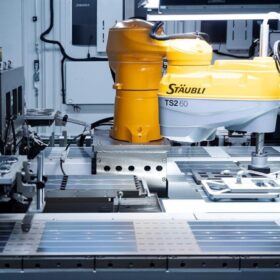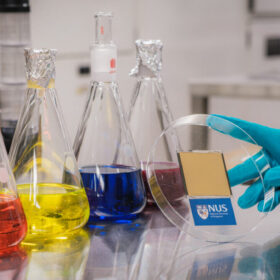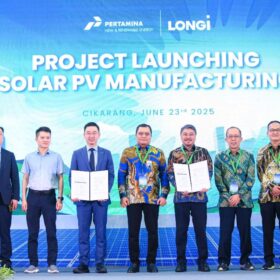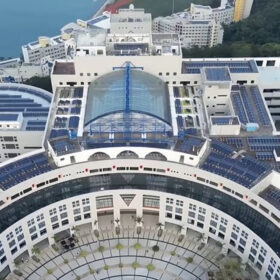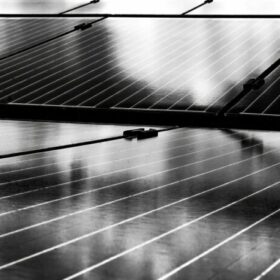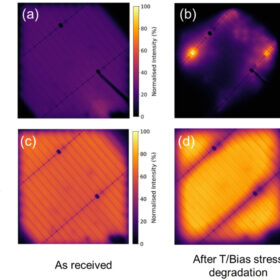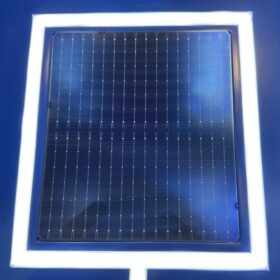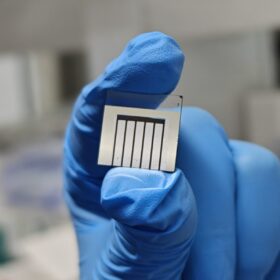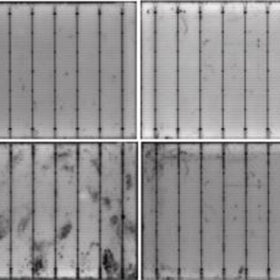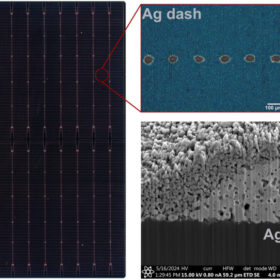Tongwei achieves 91.7% bifaciality factor for 722 W TOPCon solar module
The Chinese manufacturer said the result was confirmed by TÜV Rheinland. It was achieved through a sunken pyramid structure that reportedly achieves selective-texture on the non-electrode area of rear-side and a zebra-crossing passivation contact structure that is said to ensure excellent passivation.
SERIS achieves world record efficiency of 26.7% for perovskite-organic tandem solar cell
The tandem device is based on a bottom organic cell that can achieve a power conversion efficiency of 17.9% and a high short-circuit current density of 28.60 mA cm2. Furthermore, it uses a top perovskite solar cell with an open-circuit voltage of 1.37 V and a fill factor of 85.5%.
Longi, Pertamina begin work on 1.4 GW solar cell, module factory in Indonesia
Chinese solar manufacturer Longi and Indonesian state-owned energy company Pertamina have started construction on a 1.4 GW solar cell and module production facility in West Java, Indonesia.
Rooftop PV may ‘unintentionally’ exacerbate urban heat
New research from Hong Kong confirms that rooftop PV systems could raise daytime temperatures in urban environments. The scientists explained that although their findings highlight important urban resilience considerations, they should not detract from the broader benefits of PV systems for energy sustainability and carbon reduction.
JinkoSolar takes top spot on WoodMac’s list of PV module manufacturers
JinkoSolar led global PV module shipments in 2024, followed by JA Solar, Longi, Canadian Solar and Trina Solar, according to Wood Mackenzie. The research firm notes a growing shift toward full vertical integration among top manufacturers.
Scientists discover new failure mode in LECO-treated TOPCon solar cells
An international research team has observed a significant increase in series resistance in LECO-treated TOPCon solar cells after temperature and bias treatment. The scientists said they now need to conduct further investigations into its impact on cell efficiency, reliability, and bankability.
All solar cell efficiencies at a glance – updated
The research group led by Professor Martin Green has published Version 66 of the solar cell efficiency tables. There are 21 new results reported in the new version.
Perovksite-TOPCon tandem solar cell based on self-assembled monolayer achieves 31.1% efficiency
Researchers in China have fabricated a perovskite-TOPCon solar cell with a top perovskite device utilising a self-assembled monolayer aimed to improved cell stability. The tandem cell achieved a high fill factor and a certified efficiency of 30.9%.
Researchers warn of ‘hidden contaminants’ that could increase TOPCon, HJT solar module humidity-induced degradation
Australian researchers have identified five contaminants that could increase damp heat-induced degradation in TOPCon and heterojunction cells and modules. Their analysis has shown these contaminants could originate from improper handling during cell or module processing.
Silver-lean screen-printing can reduce silver use in TOPCon solar cells by 40%
Researchers from the University of New South Wales have teamed with international colleagues to develop a metallisation technique for TOPCon solar cells that can reportedly reduce silver usage in the devices’ rear side by 85%.

